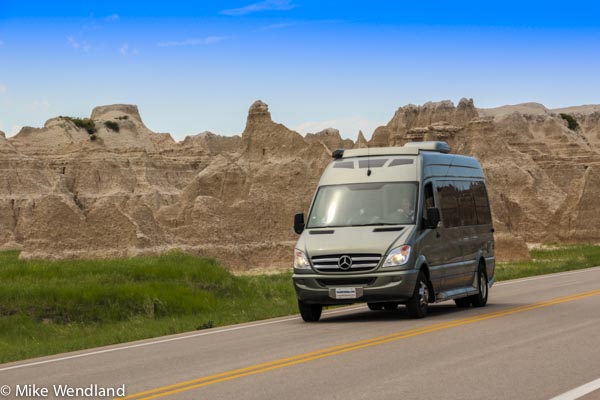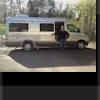Thinking of a Type B RV? Here Are the Questions You Should Ask
 Buying an RV is perhaps the second biggest purchase most of us will make next to our house. In some cases, with kids grown and newly retired from our jobs, it becomes our house as more and more people embrace the fulltiming style of a life on wheels.
Buying an RV is perhaps the second biggest purchase most of us will make next to our house. In some cases, with kids grown and newly retired from our jobs, it becomes our house as more and more people embrace the fulltiming style of a life on wheels.
And these days, Type B RVs seem to be at the top of the motorhome popularity chart. Many who bought larger Type A or C motorhomes are downsizing, or “rightsizing,,” as some call it, for the more mobile and maneuverable Type B-style campervan motorhome.
For one thing, new retirees are coming into the marketplace every day. And today’s retirees are generally healthier and more active than those who came before. The first baby boomers turned 65 three years ago. According to a Social Security agency report, over the next two decades, nearly 80 million Americans will become eligible for Social Security benefits, more than 10,000 per day.
So, in considering a Type B, what questions should be asked?
To find out, we crowd sourced the question, asking current Type B owners, members of our very active Roadtreking Facebook Group. They are the true experts, whose collective wisdom is more reliable and real world than any of the pie in the sky promises you;ll get from commission hungry RV salemen.
Here, then, is the advice of current Type B owners. Feel free to use comments below to add yours. And then pass this post along to a friend who may be considering a B.
I’ve slightly edited some of the more than 50 comments we received to weed out duplicate content or to add clarity. I’ve also edited out specific references to a particular make or model so the information is as unbiased as possible.
+++++++++++++++++++++++++++
Karsten Askeland: One of my biggest disappointments was RV dealer service after the sale. Buyers need to do their research on the dealer and ask for references and/or recommendations.
Linda Joesting Collins: Mercedes, Chevy model? Advantages and disadvantages.
Karin Bless: I see a big distinction also in the personalities of RVers. I find it important to just go into many different units, look around and imagine yourself spending your time in there and with whom, too. Only after this the more technical questions can be answered, because the selection has narrowed down then.
Nancy Kay: Dealer service quality and proximity are so important. One other question to ask yourself before purchase if you are not fulltiming is where are you going to park it? How big can it be to fit there? What about weathering in the snow and sunlight. Do you have HOA restrictions?
Darlene Meier: First thing I look for is size of bed (#1) and storage (#2). It is especial important if you plan to spend several weeks or months living in a B. Do you plan to eat your meals in the B, eat out, or a combination of the two? We do the combination, so the size of the fridge is not as important to us.
Lisa Gruner: Gas vs diesel. When we were looking, my husband was glad to see diesel, ceilings tall enough for him, the twin bed layout with the electric sofa in the back, and the bathroom. Those were his hot buttons. We walked through several You have to decide on your list of wants and must haves and be ready to compromise on some of it. Partly because down the road you’ll figure out some mods to fix it up and you’ll be glad you made your decision.
Deborah Skinner: We were coming out of an Airstream trailer and rightsizing into a B. The primary issues for us were something where I could share the driving as I pretty much refused to drive when towing the trailer – a comfortable and spacious bed – and a usable galley with decent refrigerator space. My husband wanted the Mercedes diesel for mileage and safety features – so those were the only models we considered. We are also not yet retired – but within a few years we plan to spend quite a bit of time roaming and we wanted a nimble footprint for that.
Stephanie Alexander: Match the floor plan and size of RV to your needs and of course pick reputation of manufacturer
Eric Sondeen: Fuel econ, layout, ease-of-use, riding positions (strap into all seats and ride), fit/finish, Drive & Park & Back,
John Spears: Talk to present class B owners and ask what they like about their class B. Then the most important question is, “what DON’T they like about it”? If you don’t know a class B owner, go to the nearest RV park or campground and look around. Most would be very happy to talk about their RV experiences. Determine how it’s going to be used to determine which model to consider. Gas or diesel considerations have pretty well been taken care of in the comments above. Diesel fuel is not hard to find, as most gas stations and convenience stores have diesel pumps these days. Read all the blog posts you can find from present owners. Those posts are a wealth of information, but remember a few of them may need to be taken with a grain of salt. If you ever read product reviews on the net, there always seems to be at least one really bad review when all the rest are really good.
William Browne: How are you going to use the RV? Stay in one place for periods of time or on the road and its a place to sleep and eat. Do you really need a lot of storage or not.
Laura Loschky Robinson: How easy to operate? (ex. awning, bed, swivel chairs, oven, dumping, hooking and unhooking at sites) How easy to drive and handling? (length for parking, towing, maneuvering, mountains, rain, snow) How complicated and costly is maintenance? Diesel vs. gas. Headroom, storage. Is it comfortable for sleeping, driving, bathing, sitting eating? Is it roomy for 2 (width and length) Kids? Pets? How do you clean it inside and out? Cost? New vs. used. Resale value, Mileage, Longevity? Is van good for full time, part time, weekends? Can you boondock- ex. solar, generators, satellite, boosters, etc.. Is dealer timely (in and out quickly for maintenance) professional, fair, near me? Is there a maintenance program?
Leesa Mundell: One of the most important factors, in addition to everything already mentioned, is comfort/ease in driving. We are “goers” who rarely spend more than one night in the same place, thus we are on the road a lot. We both love driving our motorhome, and feel safe in all kinds of conditions and weather. We can drive and park it anywhere, and some of our ventures have put us into places that a much longer/taller/wider rig could not have gone. All the other options for us were personal preference. Do your research and then go drive your top choices on busy streets and the highway, lie in the bed (and if regularly traveling with another person-both of you lie down together…some bed sizes are not as comfortable or convenient for two as they appear) sit inside the restroom, explore all the functions and storage areas. Make the right match for your lifestyle and you will have years of enjoyment! Husband Jeff adds, the only question to ask is, “What is the rig that makes my wife happy?”
Burton Hill: For us, it was the “what are you gonna do with it?” question that was #1. We travel to National Parks. We tour. We don’t spend days/weeks in one spot. “Small House, BIG Backyard!” sums it up for us perfectly.
Bob Clark: In short – you need to figure out FIRST how you want to live your mobile life. Our thought process was … A’s are out – too big, too expensive and too limiting. C’s were out because they were poor on gas, IMHO ugly, and many hung out way too far in the back. Didn’t want a trailer because then you had a base camp to set up and return to and (in most cases) you need an expensive pickup to lug it and I’d never own a pickup anyway. That left a turtle! Everything on board, pick up and go wherever/whenever, reasonable mileage, easy (or NO) setup/teardown, minimalist. That seemed to fit OUR intended lifestyle perfectly. Decide today where to go tomorrow, spend a LOT of time in the parks, if we like where we are, we may stay several days or weeks, if not, move on.
Michele Alexander: Ask yourself: Do I want to merely travel across this great country or do I want to experience it? I have noticed that the travelers in smaller RVs seem to spend more time outdoors. What appealed to us when we chose the Class B was its versatility:
- Go anywhere a car can go (ditto parking)
- No need to tow another vehicle
- Not just for travel – we use it for all kinds of outdoor activities and events in our home area – so handy to have a refrigerator and bathroom with you!
+++++++++++++++++++++++++++
So there you go.
Here’s a final tip from me:
Visit a large RV show that has many different RVs on display. Go in and out of each one. Find out what differentiates each model from the others.



0 Comments
Recommended Comments
There are no comments to display.
Please sign in to comment
You will be able to leave a comment after signing in
Sign In Now